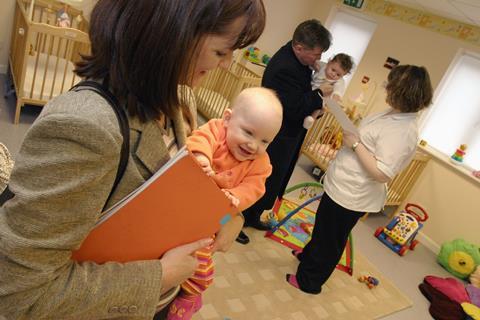The offer of free childcare has caused Hannah Wickens to prayerfully contemplate the conflict she felt about accepting it, and wonders if the reason she felt incensed was that childcare is not regarded as ‘work’.

When I first read about the government’s intention to contribute fifteen hours of free childcare a week to parents, I was delighted, knowing that our youngest could be an eligible recipient. On scrutinising the small print, I realised we only just scraped through the legal requirements, with my writing qualifying me as a ‘paid worker’ alongside my husband.
This promised benefit set upon creating a society defined by inclusivity and equality, proposes to propel mothers back into the workplace.
This promised benefit set upon creating a society defined by inclusivity and equality, proposes to propel mothers back into the workplace. And with this knowledge, I hesitated. Without the confusion of external chatter fogging my lens, (I’m having a hiatus from social media), I prayerfully contemplated the conflict I felt about accepting this childcare. I couldn’t discern if it was due to years of indoctrination on the undeniable self-sacrifice that must accompany a choice made to have a child, for the sake of that child, or whether it was because I felt incensed that childcare is not regarded as ‘work’.
After a period of extricating my beliefs from those of influencers, and dismantling self-defences erected to protect myself from perceived judgement from unknown voices, I began to discern God’s voice more clearly, without any filter.
If work is defined as a responsibility to fulfil obligations determined by another, thereby reducing the freedom of how to use those ‘work’ hours, then childcare qualifies. My toddler fits requisite conditions, but my personal situation is dubious. My professional status is saturated with over 90 hours tending to those who are dependent on me for sustenance, emotional stability and latterly educational input too, but it’s not acknowledged through renumeration.
Families create the fabric of society and when they falter, society fractures and unravels.
Families create the fabric of society and when they falter, society fractures and unravels. If those in authority relied on biblical revelation, understanding that God created the family unit to replicate his love and protection for us, I’m convinced they would reevaluate their parameters.
I propose that investment could reinforce parental input, supporting them fiscally by enabling one to remain at home, if they so choose, recognising childcare as vital and valid work. Grandparents, (or other extended family members), are potentially feeling the glow of golden years, with a social calendar rivalling the younger generation, meaning that mothers are experiencing the stretched arm syndrome of Mr Tickles in juggling all the motherhood balls. And without flogging a ubiquitous phrase, I can testify that a village is required to construct adequate childcare.
Personally, I’ve adjusted my ‘alone time’ aspiration to approximately thirty minutes a day. That covers time to inhale and exhale without a little one hogging the air or trying to resuscitate me when I’m fully awake! And of course, autonomous bathroom breaks are optional, as all those in this line of ‘work’ will concede. So, to regulate my ‘Wim Hof’ inspired breathing, I need solitary time for which a child-friendly individual must be employed. Perhaps those fifteen hours could be implemented to employ an individual to do the work of a mother, alongside a mother (who is expected to fulfil the role without payment).
I’ve recently stepped into the world of home-educating, following many tear-drenched mornings from my six-year-old, meaning that those childcare hours are even more appealing. Agreeing to home educate was influenced by nostalgic memories from pandemic days, when global uncertainty precipitated a sense of freedom to discard traditional learning for unorthodox methods of exploration; our arts and crafts sessions helped us wade through emotional instability with relative joy as a family. My present-day reality is more prosaic, with concerns about curriculum requirements versus providing a peaceful ambience to nurture emotional health.
I understand that there’s a plentiful supply of free education in England, and the choice to home educate was mine, so it would be futile to plead entitlement to a salary equivalent to state schoolteachers, but my reality increases a longing for support at home.
Read more on parenting
‘Conscious parenting’ isn’t just another mum-fad… I’m a fan, and this is how I involve Jesus
As Christian parents, should we smack our children?
There are days when I’m wistful to return to studies, where I could focus on cerebral matters that weren’t so banal or laden with insistent child demands; and in those moments, I empathise with mothers who elect paid work over childcare, knowing that ultimately, they’re probably a better parent for it, just as I was when it wasn’t so all-consuming.
It seems there isn’t a categorical solution as each situation is unique. But I’m grateful to live in a country where I have a choice that could ultimately benefit me and my children. Part of the first commandment is to love our neighbour as ourselves. For most mothers, an immediate neighbour is their child. To love them well requires love for self, which is spelled ‘time’ for mothers, in addition to support, empowering them to give more love to their offspring.




































No comments yet